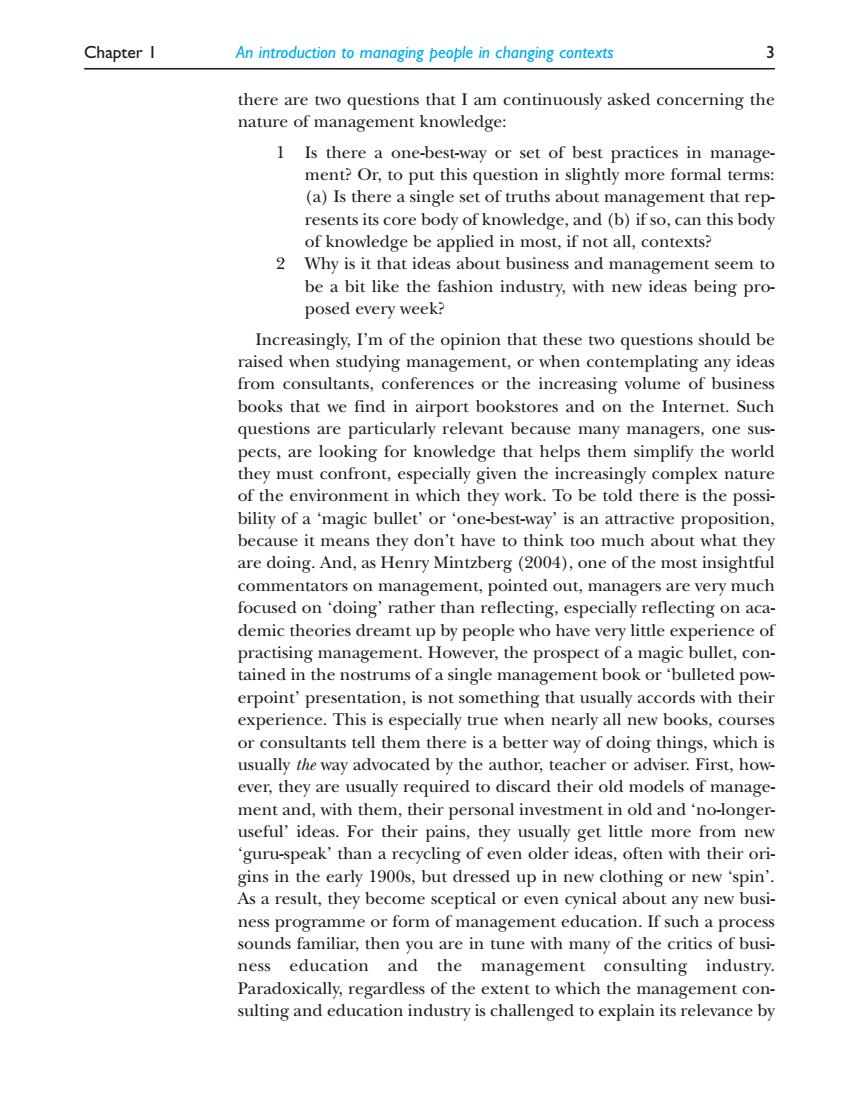正在加载图片...

Chapter I An introduction to managing people in changing contexts there are two questions that I am continuously asked concerning the nature of management knowledge: 1 Is there a one-best-way or set of best practices in manage- ment?Or,to put this question in slightly more formal terms: (a)Is there a single set of truths about management that rep- resents its core body of knowledge,and(b)if so,can this body of knowledge be applied in most,if not all,contexts? 2 Why is it that ideas about business and management seem to be a bit like the fashion industry,with new ideas being pro- posed every week? Increasingly,I'm of the opinion that these two questions should be raised when studying management,or when contemplating any ideas from consultants,conferences or the increasing volume of business books that we find in airport bookstores and on the Internet.Such questions are particularly relevant because many managers,one sus pects,are looking for knowledge that helps them simplify the world they must confront,especially bility of a 'magic bullet'or 'one-best-way'is an attractive proposition because it means they don't have to think too much about what the are doing.And,as Henry Mintzberg(2004),one of the most insightfu commentators on management,pointed out,managers are very much focused on'doing'rather than reflecting,especially reflecting on aca demic theories dreamt up by people who have very little experience of erpoint'presentation,is not something that usually accords with their experience.This is especially true when nearly all new books,courses or consultants tell them there is a better way of doing things,which is usually the way advocated by the author,teacher or adviser.First,how- ever,they are usually required to discard their old models of manage. ment and,with them,their personal investment in old and'no-longer- useful'ideas.For their pains,they usually get little more from new guru-speak'than a recycling of even older ideas,often with their ori gins in the early 1900s,but dressed up in new clothing or new 'spin As a result,they become sceptical or even cynical about any new busi- ness programme or form of management education.If such a process sounds familiar,then you are in tune with many of the critics of busi- ness education and the management consulting industrv Paradoxically,regardless of the extent to which the management con sulting and education industry is challenged to explain its relevance bythere are two questions that I am continuously asked concerning the nature of management knowledge: 1 Is there a one-best-way or set of best practices in management? Or, to put this question in slightly more formal terms: (a) Is there a single set of truths about management that represents its core body of knowledge, and (b) if so, can this body of knowledge be applied in most, if not all, contexts? 2 Why is it that ideas about business and management seem to be a bit like the fashion industry, with new ideas being proposed every week? Increasingly, I’m of the opinion that these two questions should be raised when studying management, or when contemplating any ideas from consultants, conferences or the increasing volume of business books that we find in airport bookstores and on the Internet. Such questions are particularly relevant because many managers, one suspects, are looking for knowledge that helps them simplify the world they must confront, especially given the increasingly complex nature of the environment in which they work. To be told there is the possibility of a ‘magic bullet’ or ‘one-best-way’ is an attractive proposition, because it means they don’t have to think too much about what they are doing. And, as Henry Mintzberg (2004), one of the most insightful commentators on management, pointed out, managers are very much focused on ‘doing’ rather than reflecting, especially reflecting on academic theories dreamt up by people who have very little experience of practising management. However, the prospect of a magic bullet, contained in the nostrums of a single management book or ‘bulleted powerpoint’ presentation, is not something that usually accords with their experience. This is especially true when nearly all new books, courses or consultants tell them there is a better way of doing things, which is usually the way advocated by the author, teacher or adviser. First, however, they are usually required to discard their old models of management and, with them, their personal investment in old and ‘no-longeruseful’ ideas. For their pains, they usually get little more from new ‘guru-speak’ than a recycling of even older ideas, often with their origins in the early 1900s, but dressed up in new clothing or new ‘spin’. As a result, they become sceptical or even cynical about any new business programme or form of management education. If such a process sounds familiar, then you are in tune with many of the critics of business education and the management consulting industry. Paradoxically, regardless of the extent to which the management consulting and education industry is challenged to explain its relevance by Chapter 1 An introduction to managing people in changing contexts 3